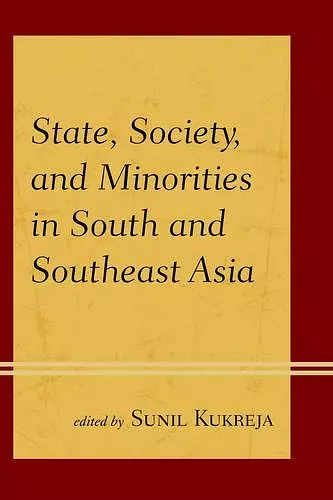State, Society, and Minorities in South and Southeast Asia
Format:Paperback
Publisher:Lexington Books
Published:14th Nov '16
Currently unavailable, and unfortunately no date known when it will be back
This paperback is available in another edition too:
- Hardback£98.00(9780739188903)

South and Southeast Asia continue to be extremely critical regions, deeply intertwined and bound in many ways by centuries of intersecting histories. As the recent experiences of rapid and transformative political and economic changes in several countries in these two regions illustrate, these changes have significant bearing on and are simultaneously affected by the legacy and continued dynamic of dominant-minority group relations. To be sure, while the dynamics of dominant-minority relations in each country are distinct and often mitigated by distinct historical conditions, the phenomenon of these dominant-minority relations, especially along ethnic and religious fault lines, are deeply consequential to many of the nations in these regions. This book, featuring eight case studies, provides a multidisciplinary and multi-layered assessment of the salience of the ethnic and religious realities in shaping various South and Southeast Asian nations. Featuring chapters on Afghanistan, Bangladesh, India, Sri Lanka, Cambodia, Thailand, Malaysia, and Indonesia, this volume provides a deep appreciation of the challenges that these societies confront in integrating and/or responding to specific ethnic and/or religious based conflicts and tensions.
The book provides a comprehensive survey of the position of minorities in South and Southeast Asia. Through vivid case studies, the authors inquire into the very foundation of the construction of minorities across ethno-religious lines and show how particular social categories are used to create patterns of social, political, and economic inclusion and exclusion. The book does not only offer an interesting perspective on the violence in the region, it also contributes to the understanding of complex relationships between majority and minority in the process of nation building. -- Karina V. Korostelina, George Mason University
There are many studies of the state and minorities in South and Southeast Asia. With the convincing combination of theoretical argument and empirical base, this is one of the most interesting. -- Rüdiger Korff, University of Passau
Kukreja brings together scholars from a number of disciplines to explore the marginalization and changing fortunes of ethnic and religious minorities in South and Southeast Asia. In the eight case studies, contributors explore the historical factors that have led to intensified violence and ethnic struggles and provide vivid accounts of the alienation minority populations suffer. Chiovenda describes how the stigmatization of the Shia Hazaras minority in Afghanistan stems from their paradoxical status as perceived outsiders, despite their deep historical attachment to the Bamyan region. Hellmann-Rajanayagam examines government inaction regarding the plight of the defeated Tamils in Sri Lanka, and Rajput traces the violent displacements suffered by the Hindu Pandits in Indian Kashmir. Benkin highlights another disturbing case of ethnic cleansing in the Indian subcontinent by critiquing the state’s complicity in the persecution of the dwindling Hindu minority in Bangladesh. Three chapters show how Chinese minorities in Indonesia, Malaysia, and Cambodia have been affected by state policies on citizenship, foreign relations, and rice farming. The final chapter profiles the resistance movement of the Islamic scholar Haji Sulong in order to contextualize the Thai government’s failed assimilation of Malay Muslims in southern Thailand. For students interested in the history of dominant-minority relations in Asia. Summing Up: Essential. Upper-division undergraduates and above. * CHOICE *
ISBN: 9781498517041
Dimensions: 231mm x 151mm x 14mm
Weight: 299g
200 pages